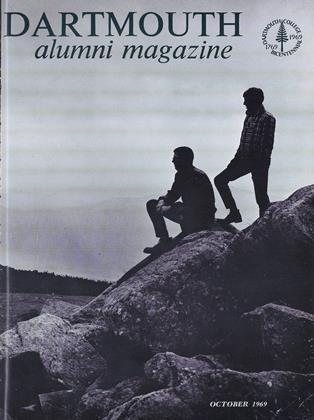THE LIBERAL DEMOCRACY IN WORLD AFFAIRS: FOREIGN POLICY AND NATIONAL DEFENSE.
OCTOBER 1969 ELMER E. SMEADTHE LIBERAL DEMOCRACY IN WORLD AFFAIRS: FOREIGN POLICY AND NATIONAL DEFENSE. ELMER E. SMEAD OCTOBER 1969
Prof.Laurence I. Radway (Government). Withan introduction by Senator Thomas J.Mclntyre '37. Glenview: Scott, Foresmanand Company, 1969. 207 pp. $4.25. Softbinding, $2.25.
Dartmouth alumni will find this book interesting and valuable. It should not be limited to college courses. Its appeal is to all people concerned about American foreign policy. News columnists and commentators should read it for background and perspective when preparing their columns. Moreover, no reader will find the book difficult; it is too dramatically and clearly written for that.
In describing the making of foreign policy, Professor Radway starts with "the primacy of the White House" but then quickly shows that Presidential authority is subject to many restraints. Influences upon his discretion are exerted by executive agencies, intelligence officials, foreign countries and the international environment, the State Department, the diplomatic service and the practical techniques of diplomacy, Congress, the military and economic "communities," scientists, interest groups, the press, and the general public. The strengths and weak- nesses of these "participants" are analyzed; their influences are sometimes subtle, sometimes heavy-handed, and sometimes the resuit more of fear than of power. Some of the dangers are secrecy and a "self-righteous conviction that America's purposes are God's purposes."
Perspective is achieved by citing specific incidents, experiences and changes, both in the United States and in the world. Many of the illustrations are drawn from the Cold War, the Korean War, and Vietnam. The making of American foreign policy is indeed a complex process; it is "not made in a national vacuum." Therefore, this book should be read and studied by all people who fear that a monolithic military-industrial complex has acquired a virtually unlimited power.
Radway does not wage any holy wars for or against any particular policies or any particular participants in policy-making. Indeed, he could not do so and, at the same time, hold to his optimistic point of view. He sees in America a "capacity for selfcorrection"; foreign policy is constantly being made, evaluated, and re-made. This reviewer believes that Radway's optimism is realistic and sophisticated; it is supported by the evidence.
Mr. Smead is Professor of Government atDartmouth College.
 View Full Issue
View Full Issue
More From This Issue
-
 Feature
FeatureThird Century Fund Launches General Campaign Among Alumni
October 1969 -
 Feature
FeatureThe Transcending Great Issues
October 1969 -
 Feature
FeatureA Scientific Centennial for Dartmouth
October 1969 By ALLEN L. KING -
 Feature
FeatureWhitewater Racing Gains New Status
October 1969 By JAY EVANS '49 -
 Feature
FeatureBicentennial Draws Unusual Gifts
October 1969 -
 Article
ArticleWith the Big Green Teams
October 1969
ELMER E. SMEAD
-
 Letters to the Editor
Letters to the EditorLETTERS
April 1960 -
 Books
BooksINTRODUCTION TO THE STUDY OF PUBLIC ADMINISTRATION
June 1939 By Elmer E. Smead -
 Feature
FeatureThe Broadcasters and the Government
February 1960 By ELMER E. SMEAD -
 Books
BooksIDEOLOGIES AND UTOPIAS: THE IMPACT OF THE NEW DEAL ON AMERICAN THOUGHT.
JANUARY 1972 By ELMER E. Smead -
 Books
BooksPRESSURE GROUPS ON THE LEGISLATURE OF NEW JERSEY
January 1939 By ELMER E. SMEAD, Harold G. Rugg '06
Books
-
 Books
BooksPRACTICAL CANDY MAKING
FEBRUARY 1930 -
 Books
BooksTHE CASE FOR EXPERIENCE RATING IN UNEMPLOYMENT COMPENSATION AND A PROPOSED METHOD
May 1939 -
 Books
BooksGOETHE AND MUSIC.
April 1955 By FRANK G. RYDER -
 Books
BooksAMAZING BUT TRUE: STORIES ABOUT PEOPLE, PLACES, AND THINGS.
MAY 1973 By JOHN HURD '21 -
 Books
BooksSons and Fathers
October 1975 By ROBERTH. ROSS '38 -
 Books
BooksFaculty Publications
July 1951 By Royal C. Nemiah

